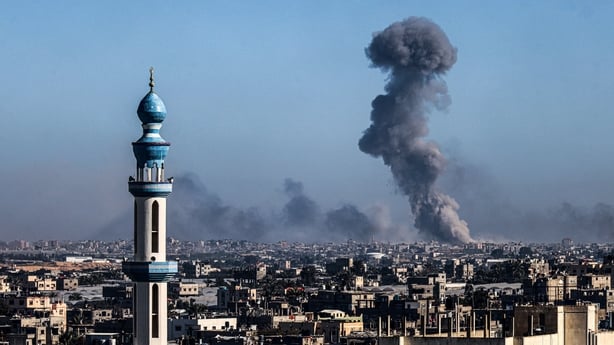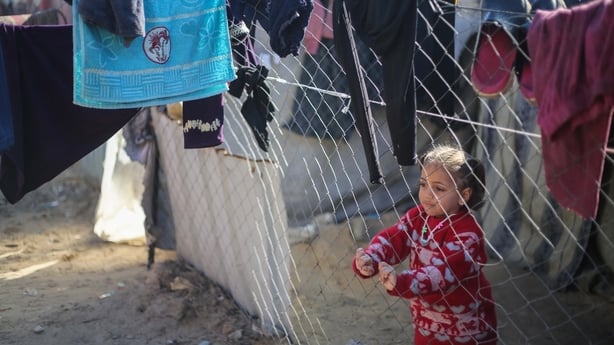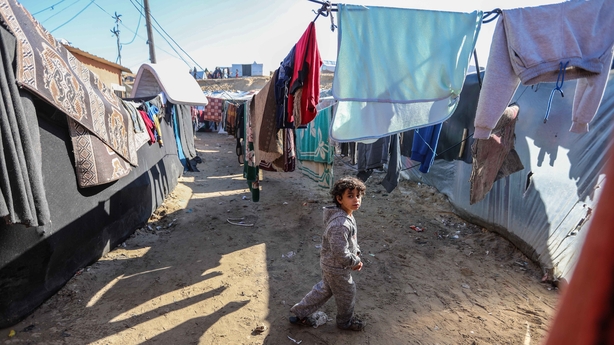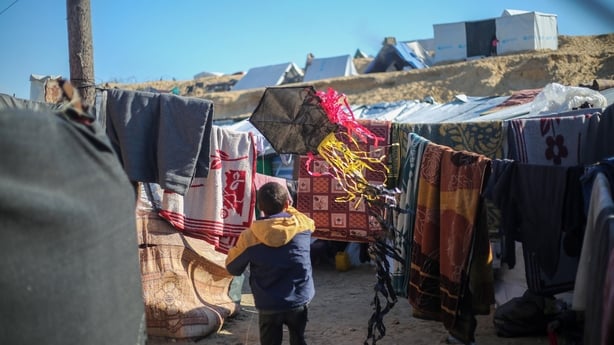US President Joe Biden has told Israeli Prime Minister Benjamin Netanyahu that a military operation in the overcrowded city of Rafah in southern Gaza should not proceed unless a plan for "ensuring the safety" of the population was laid out first, the White House said.
Rafah, on the border with Egypt, has remained the last refuge for Palestinians fleeing Israel's relentless bombardment elsewhere in Gaza in its four-month war against Hamas, triggered by the group's 7 October attack.
The US, UN and foreign governments have voiced deep concern over Mr Netanyahu's plans to invade the city, where some 1.4 million people have crowded, with many living in tents amid increasingly scarce supplies of food, water and medicine.
Mr Biden "reaffirmed his view that a military operation in Rafah should not proceed without a credible and executable plan for ensuring the safety of and support for the more than one million people sheltering there," the White House said in a readout of the two leaders' call today.
Mr Netanyahu, in extracts of an interview published yesterday evening, insisted the Rafah operation would go ahead "while providing safe passage for the civilian population so they can leave".

When pressed about where the population was supposed to go, Mr Netanyahu said in the interview aired Sunday: "You know, the areas that we've cleared north of Rafah, plenty of areas there. But, we are working out a detailed plan."
Not entering Rafah and confronting holdout Hamas battalions would amount to losing the war, the prime minister said.
Mr Netanyahu told ABC's This Week programme that "enough" of the 132 remaining Israeli hostages held in Gaza are alive to justify Israel's ongoing war in the region.
Asked how many of the hostages are still alive, Mr Netanyahu said "enough to warrant the kind of efforts that we're doing".
However, Hamas warned that any Israeli offensive in Gaza's far-southern city of Rafah would threaten talks about the release of hostages seized in the 7 October attacks.
"Any attack by the occupation army on the city of Rafah would undermine the exchange negotiations," the Palestinian militants said.

A senior Biden administration official said today that negotiators working on a phased framework deal to secure the release of the remaining hostages have made "real progress" over the last few weeks.
Hamas's 7 October attack on Israel resulted in the deaths of about 1,160 people, mostly civilians, according to an AFP tally based on official figures.
The health ministry in Gaza says the massive Israeli offensive since 7 October has killed at least 28,064 people, mostly women and children.
The White House said in a statement that in the phone call with Mr Netanyahu, Mr Biden had "reaffirmed our shared goal to see Hamas defeated and to ensure the long-term security of Israel and its people".
"He also called for urgent and specific steps to increase the throughput and consistency of humanitarian assistance to innocent Palestinian civilians," it added.
The Sunday morning call is the first announced contact between Mr Biden and Mr Netanyahu since the US president said he viewed Israel's military campaign in Gaza as being "over the top."
"There are a lot of innocent people who are starving, a lot of innocent people who are in trouble, dying, and it's got to stop," Mr Biden told reporters on Thursday, in comments widely perceived as a harshening of his tone against Israel.
The Israeli prime minister told the "Fox News Sunday" programme earlier today that he has not talked with Mr Biden since his "over the top" comment on Thursday and did not know what the US leader meant by it.

Meanwhile, Palestinian President Mahmoud Abbas arrived in Doha today, for talks on securing a ceasefire in the Gaza war with the Qatari emir, whose country has been at the heart of mediation efforts and hosts political leaders of militant group Hamas.
Palestinian news agency WAFA said Abbas would meet Emir Sheikh Tamim bin Hamad Al Thani tomorrow, but did not say if he would also meet leaders of Hamas, a group that has long been at odds with Abbas and his West Bank-based Fatah group.
The Palestinian ambassador to Qatar, Munir Ghannam, told Voice of Palestine Radio today that Abbas and the Emir would discuss efforts to secure a Gaza ceasefire with Israel and ways to increase aid for the territory's 2.3 million people.
"Qatar plays an important role in the international efforts and mediation to reach a ceasefire. Therefore, coordination with Qatar, also with Egypt, is of special importance, to bring an end to this aggression against our people," Mr Ghannam said.
Read more:
Six-year-old Gaza girl dies after days trapped under Israeli fire
